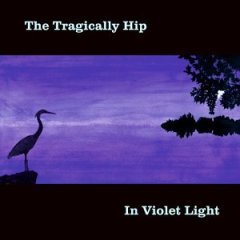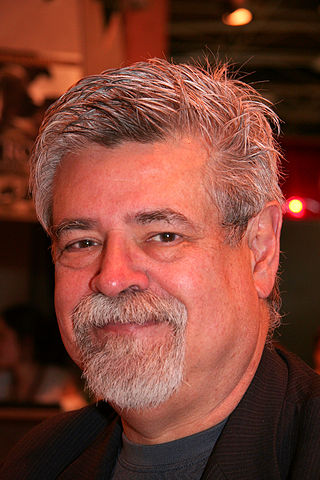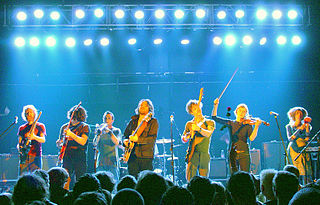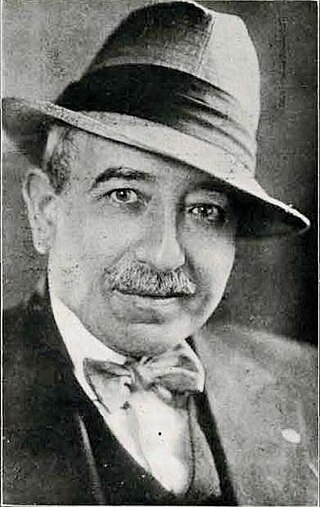Richard Feist may refer to:
- Richard Feist (luger)
- Richard Feist (philosopher)
- Richard Feist, A headteacher of The Bemrose School
Richard Feist may refer to:

In Violet Light is the eighth full-length album by Canadian rock band The Tragically Hip. The album debuted at #2 on the Canadian Albums Chart, selling almost 33,000 copies in its first week. The album has been certified platinum in Canada.

Merrill Nisker, better known by her stage name Peaches, is a Canadian electroclash musician and producer.

Raymond Elias Feist is an American fantasy fiction author who wrote The Riftwar Cycle, a series of novels and short stories. His books have been translated into multiple languages and have sold over 15 million copies.
The Water may refer to:

Broken Social Scene is a Canadian indie rock band and musical collective including as few as six and as many as nineteen members, formed by Kevin Drew and Brendan Canning in 1999. Alongside Drew and Canning, the other core members of the band are Justin Peroff (drums), Andrew Whiteman (guitar) and Charles Spearin (guitar).
Magician or The Magician may refer to:
Feist may refer to:

Leslie Feist, known mononymously as Feist, is a Canadian indie pop singer-songwriter and guitarist, performing both as a solo artist and as a member of the indie rock group Broken Social Scene.

Arts & Crafts Productions is a music-focused media and artist services company that offers information as an independent record label, management firm, merchandiser, and publisher worldwide. It has earned 21 Juno Awards. Arts & Crafts has been called one of Canada's most important record labels.

John Frederick Coots was an American songwriter. He composed over 700 popular songs and over a dozen Broadway shows. In 1934, Coots wrote the melody with his then chief collaborator, lyricist Haven Gillespie, for the biggest hit of either man's career, "Santa Claus Is Comin' to Town." The song became one of the biggest sellers in American history.

A feist is a small hunting dog. This group descended from the terriers brought over to the United States by British miners and other immigrants. These terriers probably included crosses between the Smooth Fox Terrier, the Manchester Terrier, and the now-extinct English White Terrier. These dogs were used as ratters, and gambling on their prowess in killing rats was a favorite hobby of their owners. Some of these dogs have been crossed with Greyhounds, Whippets or Italian Greyhounds, and Beagles or other hounds — extending the family to include a larger variety of purpose than the original ratter, or Rat Terrier.

The Reminder is the third studio album by the Canadian singer-songwriter Feist. It was released on April 23, 2007 in countries outside of North America, and May 1, 2007 in the United States and Canada.
The Juno Awards of 2008 were held in Calgary, Alberta, Canada on the weekend ending 6 April 2008. These ceremonies honoured music industry achievements in Canada in the latter part of 2006 and in most of 2007.

The 2007 edition of the Canadian Polaris Music Prize was presented on September 24, 2007, at the Phoenix Concert Theatre in Toronto.

"1234" is a song by Canadian singer-songwriter Feist from her third studio album, The Reminder. The song was co-written by Feist and Sally Seltmann, an Australian singer-songwriter who also recorded under the stage name New Buffalo. It remains Feist's biggest hit single in the US to date, and her only song to chart on the Billboard Hot 100 and UK Top 40.

"I Feel It All" is a song by Canadian indie pop singer-songwriter Feist, released as the third single from her third full-length album, The Reminder (2007), in 2008. The song was acclaimed by music critics and appeared on several music charts, peaking at number 47 on the Canadian Hot 100 and number 22 on the US Billboard Triple A chart. The single-shot music video features Feist igniting many oil drums and fireworks as she runs around a field at night.
Feist Publications, Inc., v. Rural Telephone Service Co., 499 U.S. 340 (1991), was a landmark decision by the Supreme Court of the United States establishing that information alone without a minimum of original creativity cannot be protected by copyright. In the case appealed, Feist had copied information from Rural's telephone listings to include in its own, after Rural had refused to license the information. Rural sued for copyright infringement. The Court ruled that information contained in Rural's phone directory was not copyrightable and that therefore no infringement existed.

Dark Was the Night is the twentieth compilation release benefiting the Red Hot Organization, an international charity dedicated to raising funds and awareness for HIV and AIDS. Featuring exclusive recordings by a number of independent artists and production by Aaron and Bryce Dessner of the National, the compilation was released on 16 February 2009 (UK) and 17 February (US) as a double CD, three vinyl LPs, and as a digital download. John Carlin, the founder of the Red Hot Organization, was the executive producer for the album. The title is derived from the Blind Willie Johnson song "Dark Was the Night, Cold Was the Ground", which is covered on this collection by the Kronos Quartet.

Leopold Feist was a pioneer in the popular music publishing business. In 1897, Feist founded and ran a music publishing firm bearing his name. In the 1920s, at the height of the golden age of popular music, his firm was among the seven largest publishers of popular music in the world. The company used the motto "You can't go wrong, with any FEIST Song."

Metals is the fourth studio album by the Canadian singer-songwriter Feist. It was released on September 30, 2011 in Ireland, Austria, Switzerland, Germany, Sweden and Belgium; October 3, 2011 in the United Kingdom; and October 4, 2011 in the United States and Canada. The first single from the album is "How Come You Never Go There", which was released on August 12, 2011. The album was supported by a world tour which started in Amsterdam, Netherlands on October 15, 2011 and finished on October 20, 2012 in Latin America.